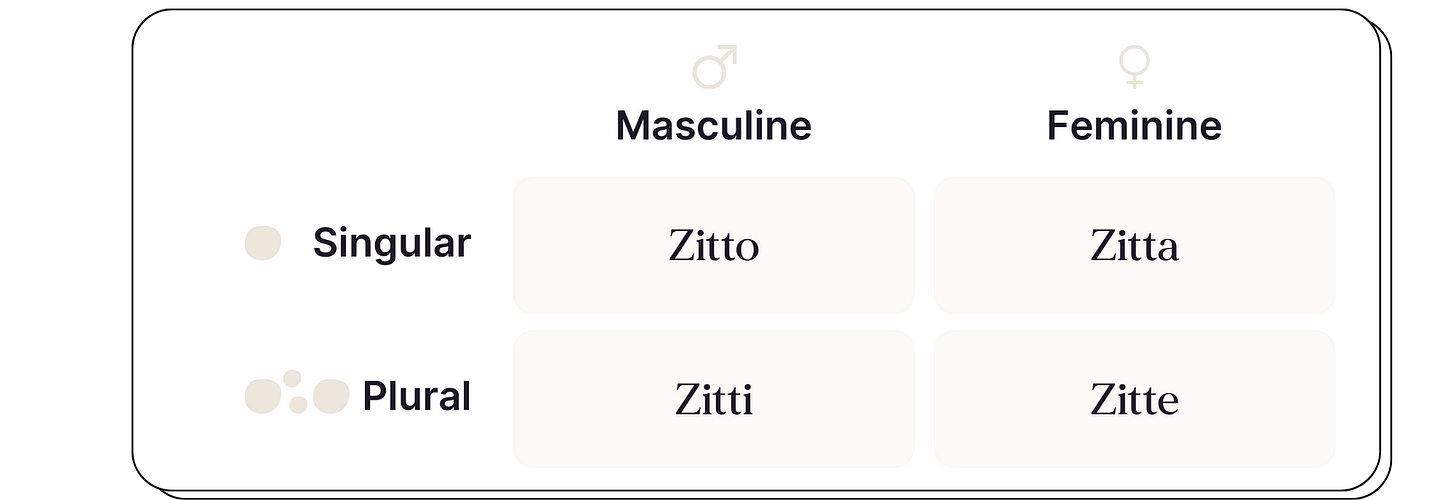🎙️ COME SI PRONUNCIA?
[TSEET-toh]
🇮🇹 Attenzione: la Z è sorda (qui sotto la spiegazione della differenza Z sorda e sonora data dall’insegnante Lucrezia nel nostro corso di pronuncia)
🇬🇧 Attention: the Z is unvoiced (below you'll find Teacher Lucrezia's explanation of the difference between unvoiced and voiced Z from our pronunciation course)
AGGETTIVO / ESCLAMAZIONE
ADJECTIVE / EXCLAMATION
Quiet, silent.
🇮🇹 Che tace, non fa rumore, non parla.
🇬🇧 That doesn't speak, doesn't make noise, doesn't talk.
💬 ESEMPI
Zitto! Sta per cominciare il concerto.
Quiet! The concert is about to begin.
È stata sempre zitta durante tutta la serata.
She remained silent throughout the entire evening.
"State zitti!", sussurrò la mamma, "il bambino sta dormendo."
"Be quiet!", whispered the mom, "the baby is sleeping."
📚 ESPRESSIONI UTILI
Stare zitto
→ To keep quiet
Se non sai rispondere, è meglio che tu stia zitto.
If you don't know how to answer, it's better to keep quiet.
Far stare zitto
→ To shut someone up
Ci penso io a farlo star zitto.
I'll take care of shutting him up.NB: you can also you the verb zittire
Zitto zitto
→ Quietly, discreetly
Se ne è andato via zitto zitto, senza neppure salutare.
He left quietly, without even saying goodbye.
Zitto zitto, quatto quatto
→ Quietly and stealthily
Zitta zitta, quatta quatta, Maria entrò in cucina a mezzanotte per rubare l'ultimo pezzo di torta.
Quietly and stealthily, Maria entered the kitchen at midnight to steal the last piece of cake.
Non saper stare zitto
→ Not to be able to keep a secret (literal: not to be not able to shut up)
Non dirle nulla, non sa stare zitta.
Don't tell her anything, she can't keep a secret.
Zitto e mosca
→ Mum's the word / Keep it under your hat (literal: quiet and a fly 🪰)
Zitto e mosca su quello che ti ho detto, è un segreto.
Mum's the word about what I told you, it's a secret.
🔎 L’ORIGINE DELLA PAROLA
🇮🇹 Zitto è nato nel 1500 ed è un'onomatopea.
Proviamo a pronunciare "zitto" lentamente:
Inizia con un suono 'z' che blocca l'aria per un attimo.
Poi c'è una breve 'i'.
Segue una doppia 't' che ferma di nuovo il suono.
Infine, si apre con una 'o'.
Se ci pensiamo, quando diciamo a qualcuno di stare zitto, facciamo proprio questi suoni: prima blocchiamo l'aria (come per fermare il parlare), poi la lasciamo uscire un po', e alla fine apriamo la bocca.
Quindi, il modo in cui pronunciamo "zitto" imita l'azione di fermare il parlare. È come se la parola stessa ci mostrasse come fare silenzio!
🇬🇧 Zitto was born in the 1500s and is an onomatopoeia. This means that the sound of the word imitates what it describes.
Let's try to pronounce "zitto" slowly:
It starts with a 'z' sound that blocks the air for a moment.
Then there's a short 'i'.
It's followed by a double 't' that stops the sound again.
Finally, it opens with an 'o'.
If we think about it, when we tell someone to be quiet, we make these exact sounds: first, we block the air (as if to stop talking), then we let it out a little, and finally, we open our mouth.
So, the way we pronounce "zitto" imitates the action of stopping speech. It's as if the word itself shows us how to be silent!
👉 YOUR TURN
Can you use the word ZITTO correctly in a sentence?
Based on the definition and examples provided, write a sentence using today's word of the day and share it as a comment on this post. It is important that your sentence makes sense and shows that you understand the word's definition, but we also encourage you to use creativity and have fun.






La mia amica Silvia é buona ma ha un grande problema: no sa stare zitta.
Un Tempo viene quando persone non possono stare zitti delle cose sbagliate nella società - dobbiamo parlare.